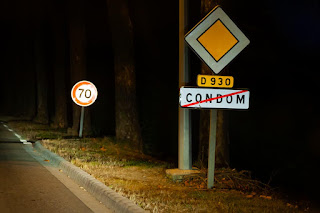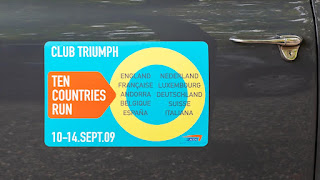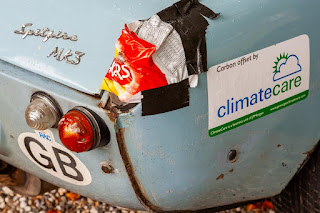Slow but steady progress on preparing various parts, in preparation for the moment when I can start with reassembling the car. One of the jobs I tackled last week was the fuel tank. There are loads of horror stories about TR7’s with rusty and leaking fuel tanks, but this one clearly doesn’t belong to that group. As you can see the most vulnerable part, the underside, is completely free of the dreaded tin worm;
There's only some slight surface rust on top of the welding seam;
And this despite the fact that the factory protection is rather flimsy to say the least, just one thin layer of paint without any primer. Although it is possible that the tank has been replaced somewhere in the past, as the area above the tank had some rather non factory rust protection. So only thing I had to do was remove the fuel gauge sender and fuel pipe, sand the tank down;
And with a few rattle cans of matt black paint, give it a new and hopefully better coating;
With the coating done I turned my attention to the fuel pipe and fuel gauge sender.
As the last one had been working properly before I dismantled the car I presume it still does. So only thing I did to it was give it a good clean.
There's only some slight surface rust on top of the welding seam;
And this despite the fact that the factory protection is rather flimsy to say the least, just one thin layer of paint without any primer. Although it is possible that the tank has been replaced somewhere in the past, as the area above the tank had some rather non factory rust protection. So only thing I had to do was remove the fuel gauge sender and fuel pipe, sand the tank down;
And with a few rattle cans of matt black paint, give it a new and hopefully better coating;
With the coating done I turned my attention to the fuel pipe and fuel gauge sender.
As the last one had been working properly before I dismantled the car I presume it still does. So only thing I did to it was give it a good clean.
The fuel pipe was an interesting one as there was quite a lot of dirt between pipe and filter, but none inside the pipe or filter. Then there was some (very fine) dirt trapped in the filter gauze itself, but I couldn’t get that out completely without damaging the gauze, so some of it is still there. But an inline filter between tank and fuel pump should take care of any dirt slipping through.
And last but not least I inspected the inside of the tank before I put the fuel gauge sender and suction pipe back. Inside was rust free with no dirt worth mentioning, only what looked like chalk or crystal deposits. As this didn’t come of when I scraped it with a screw driver I didn’t waste any energy on it. This will also being taken care of by an inline filter!
And last but not least I inspected the inside of the tank before I put the fuel gauge sender and suction pipe back. Inside was rust free with no dirt worth mentioning, only what looked like chalk or crystal deposits. As this didn’t come of when I scraped it with a screw driver I didn’t waste any energy on it. This will also being taken care of by an inline filter!
As you can see from the pictures above the tank is from a PI (or TR8) which isn’t strange as the donor car started life as a PI. But this means the tank has something like a built in swirl pot, in which the fuel pipe is mounted. This of course is an added bonus as it helps with preventing fuel starvation while cornering with an almost empty tank.




































































